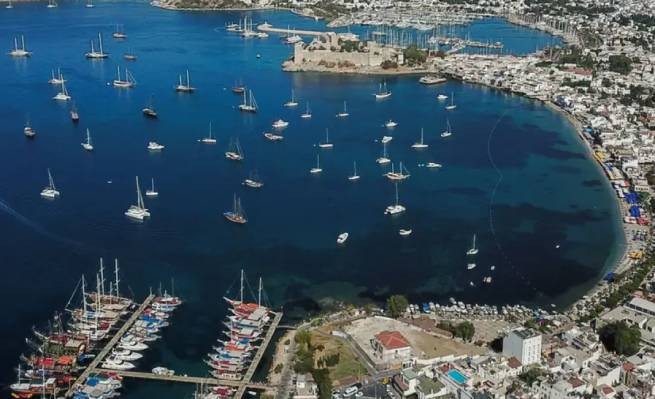Not only the Greek islands of the Aegean Sea, but also tourist resorts on the Turkish coast are faced with manifestations of the climate crisis – a lack of water in the Aegean Sea.
How writes DW, ancient Halicarnassus (Bodrum) in particular was left without water. The main reasons are drought and human factors worsening the situation, as water from the dams is used to cool three coal-fired power plants in the area. Another reason is the reckless use of water resources for swimming pools.
Deutsche Welle reports on the Turkish resort of Bodrum’s unequal battle with water shortages. Autumn rains do not solve the problem, they only bring temporary relief. The impressive man-made lake has long lost its former grandeur – there is very little water in it, and it is located in the middle of a scorched, cracked land east of the pearl of the Aegean Sea – the Turkish resort of Bodrum.

The Mumkular dam and another reservoir have been closed since mid-October and have become a symbol of water shortages in the area. At first, the tourists did not notice this. Only after the end of the season was the water in Bodrum turned off several times for several hours. The municipality opened new wells and delivered drinking water to residents in tanks.
The periodic rains now do not inspire hope – there are already great fears about next summer. Due to the fact that the population of Bodrum increases during the holiday season, water will have to be provided, according to the municipality, at least a million people. Mayor Ahmer Aras talks about the worsening situation:
“We are experiencing water shortages unprecedented in our history due to drought.”
Mirbahatin Demir, a spokesman for environmental organization Mucep in Bodrum, admits water shortages have been a problem in the region for 30 years, but have now reached “a completely different level” due to climate change and poor water management.
The situation in Bodrum is indicative of what is happening in many parts of Turkey. In addition to the Aegean Sea, the Marmara region is particularly affected by drought. Dams around Istanbul are at record low levels. Turkey suffered from extreme heat during the summer, with temperatures above normal until November. Professor of Meteorology at Istanbul Technical University Baris Enol states:
“The drought has been going on for a year now, it is causing increased evaporation of soil water due to the heat, and this is making the situation worse. If this winter is as dry as the previous one, it will be difficult to survive the summer of 2024. The real problem is that droughts follow one another. This will also have a negative impact on horticulture.”
According to the professor, the media and government “should constantly encourage wise use of water and provide relevant information, because in the case of drought, by the time you feel it, it will be too late.”
He has no illusions and expects little from political meetings such as the COP28 world climate conference, which takes place next week in Dubai. Climate change is primarily an economic issue, and Turkey must also convert and fully adapt its production to renewable energy sources.
Turkey has signed the Paris Climate Agreement and has set a goal of achieving net zero climate impact by 2053. Last year, solar and wind energy accounted for 16% of the country’s total energy consumption, and hydropower about 20%.
Turkish President Erdogan has repeatedly put climate change on the agenda in the face of extreme events. However, the government has been criticized for supporting large construction projects and land closures. When environmentalists protested in the summer, for example, against the cutting down of the Akbelen forest to build a lignite power plant, the president made it clear that he did not want to give up coal. Environmental activist Demir says: “Deforestation in Akbelen has in turn worsened water shortages in Bodrum.”
According to official data, about 18 million cubic meters of water were used in Bodrum last year. According to the ecologist, about 9 million of them were pumped out of groundwater in Akbelen and are now lost. Water from the dams is also used to cool three coal-fired power plants in the area. They should be shut down and replaced with solar power, he says.
Excessive water consumption from private pools and lawns is another problem. According to the municipality, there are approximately 30,000 swimming pools in Bodrum. The mayor urged owners not to empty them this winter, but to reuse the treated water. However, the municipality has so far avoided introducing radical measures.
According to the activist, the fact that new wells are constantly being opened is only a temporary solution and will worsen the problem in the long run. There are even concerns that excessive groundwater depletion could lead to salinity in drinking water.
The climate issue is also relevant for Greece. As our publication reported, mild to moderate drought conditions in October 2023 were recorded on 38% of the territory of Greece, the meteo.gr service of the Athens National Observatory reported. The drought in central and eastern Macedonia and especially in the Thrace region is classified as moderate and in some places as extreme. Moderate drought prevailed in parts of the central and eastern Peloponnese, eastern central Greece (including Attica), central and southern Evia, and some Aegean islands. In addition, moderate drought conditions were observed in some areas of central and western Macedonia.







More Stories
Black swan in the Evros river delta
The weather will turn bad on Good Friday
Crete "shaking" – two earthquakes this morning